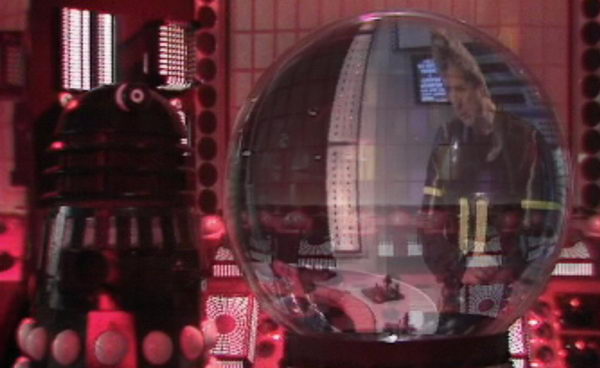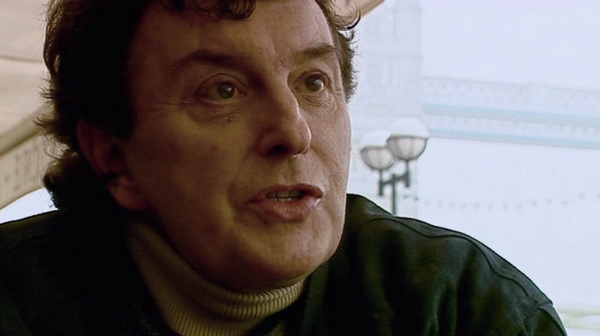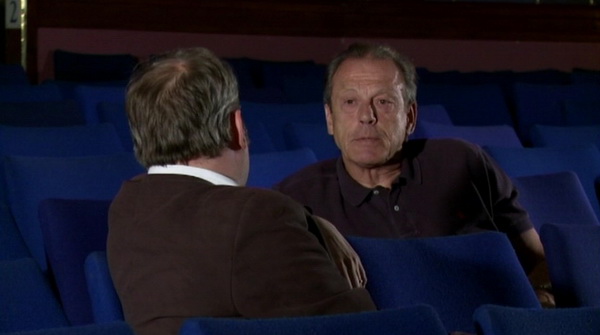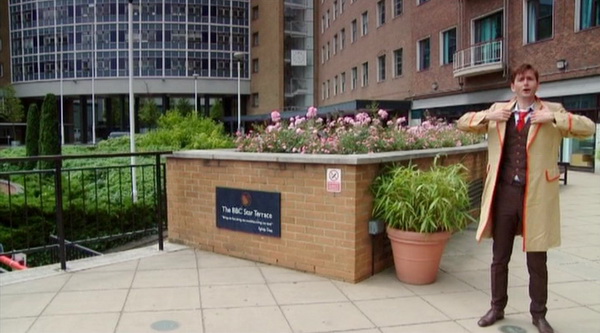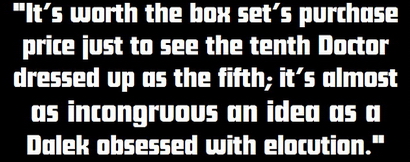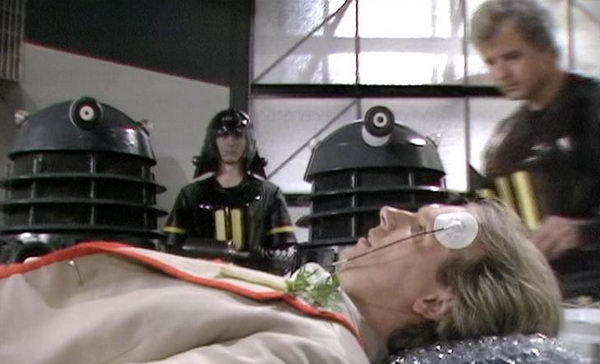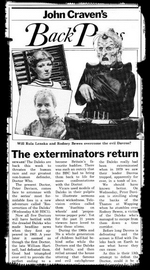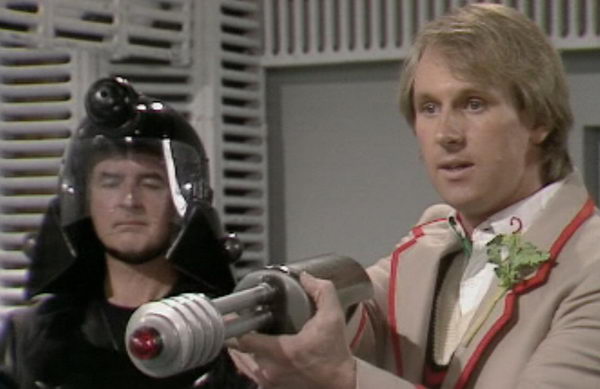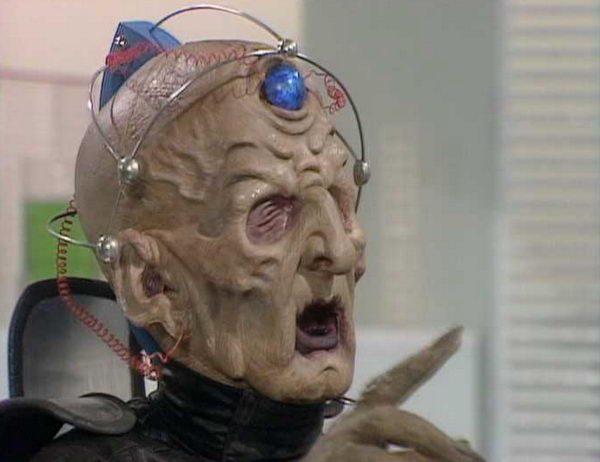|
| |
|
STORY PLACEMENT THIS STORY TAKES PLACE BETWEEN THE TV STORY "FRONTIOS" AND THE NOVEL "LORDS OF THE STORM."
PRODUCTION CODE 6P
WRITTEN BY ERIC SAWARD
DIRECTED BY MATTHEW ROBINSON
RATINGS 7.7 MILLION
WORKING TITLES THE WARHEAD,
THE RETURN &
RECOMMENDED PURCHASE 'REVISITATIONS 2' DVD BOX SET (BBCDVD2956) RELEASED IN MARCH 2011.
BLURB the TARDIS IS TRAPPED IN a Time Corridor, FORCING THE DOCTOR, TEGAN AND TURLOUGH TO MATERIALISE IN AN ABANDONED PART OF LONDON IN 1984.
THE CORRIDOR LINKS EARTH WITH A BATTLE CRUISER IN THE FUTURE THAT CONTAINS THE DOCTOR'S OLDEST ENEMY - THE DALEKS. HAVING LOST THE WAR WITH THE MOVELLANS, ONLY ONE PERSON CAN NOW HELP THE EVIL RACE. IT IS TIME FOR THE DALEKS TO RESURRECT THEIR CREATOR, DAVROS.... |
|
|
Resurrection of the Daleks 8th february 1984 - 15th february 1984 (2 45-MINUTE EPISODES)
I was rather surprised when, a few years ago, the Resurrection of the Daleks DVD appeared in the otherwise-lush Davros box set just as it had been released in late 2002, less its distinctive rubber packaging. Like the original Remembrance of the Daleks release, which the Davros box set would eventually embroider, Resurrection contained only a very limited array of special features which didn’t feel equal to the significance of the story. However, now the serial has been given the same luxuriant treatment as its 1980s’ siblings, and the result is nothing short of sensational.
Originally conceived as a four-part adventure, BBC coverage of the 1984 Winter Olympics prompted the decision to hastily re-edit Resurrection into two extended episodes, which aired on consecutive Wednesdays. However, much to many fans’ chagrin, this version of the story was never made available commercially – its many VHS releases and even the 2002 DVD all contained the “originally-prepared” four-parter. This revisitation, however, keeps everybody happy, boasting both versions, each subtly enhanced by a 5.1 sound mix.
Above: The final word from John Nathan-Turner On Location
Each edition of the serial comes with its own commentary. Most viewers will probably opt for the four-parter’s lively track, which sees fifth Doctor Peter Davison and Tegan actress Janet Fielding discuss everything from Davison’s dentistry to Rodney Bewes’ lisp and Fielding’s legs, while director Matthew Robinson quietly laments the fact that the complaints about the serial’s vivid violence and high body count were dwarfed by those criticising the depiction of a single character smoking. The recently-recorded commentary for the two-part version is a little more stoic, but no less edifying, as Dalek operator Nick Pegg moderates the musings of former script editor Eric Saward, Davros actor Terry Molloy and visual effects supervisor Peter Wragg.
The original release’s principal bonus offering, On Location, is preserved here. This feature sees Michael Robinson revisit Shad Thames, where the serial’s external sequences were shot, and features interviews with Eric Saward and then-producer John Nathan-Turner, who passed away shortly after recording his contribution. Whilst disappointingly short, this feature does offer exceptional insight into the production of the story, and particularly the tumultuous working relationship between Robinson, Saward and Nathan-Turner.
Above: Toby Hadoke interviews Leslie Grantham for Casting Far and Wide
This feature is then complemented by Casting Far and Wide, which looks at Resurrection of the Daleks from the perspective of several actors who appeared in it. I was surprised by how much I liked this programme, as usually the documentaries that I prefer are those that chart the evolution of a story from script to screen. The actors that Toby Hadoke interviews here range from ex-cons turned EastEnders superstars to more jobbing actors and even those who’ve enjoyed success, yet can’t see it. Each of the performers interviewed speaks with real candour, offering viewers a window into one of the world’s most brutal businesses.
The Resurrection-themed features are completed by an interesting collection of extended and deleted scenes; a couple of excerpts from the BBC’s Breakfast Time show featuring Janet Fielding and John Nathan-Turner; the original trailer for Part 1; and the usual photo gallery, but the precession doesn’t stop there. The special edition release also includes a number of more tenuously-related titbits, such as The Last Dalek film (originally released on the 2003 Seeds of Death DVD), which offers modern fans a slanted glimpse of the lost Evil of the Daleks’ fiery climax, complete with commentary from the visual effects designers who worked on the show; the fifth Doctor’s instalment of Tomorrow’s Times, which subjects viewers to the exasperating opinions of contemporary columnists; a TARDIS-Cam; and a Walrus. The latter skit is scarcely a minute long, and so I was hesitant to make a disproportionate lengthy comment about it, but I can’t resist saying that it is one of 2|entertain’s most outlandish offerings to date. Listening to a Dalek that doesn’t sound like Nick Briggs is remarkable enough these days, but having it take it upon itself to eradicate Welsh inflections from wives in mine shifts really is something else.
Above: Come in Number Five... or number Ten?
And all this is secondary to the serial itself, which remains to this day a personal favourite of mine. Writer Eric Saward doesn’t seem to be all that enamoured with it, looking back, but I think that it stands up very well today. Resurrection of the Daleks sees Saward portray the Daleks and their creator with same earnestness that he did the Cybermen in Earthshock – here they are just not dilapidated pepper pots or Davros’s feeble playthings, but cunning, deadly monsters who so very nearly win.
The Doctor, likewise, is unchained from the usual constraints of his character, the weight of events forcing him to pick up a firearm not once, but twice. Once, he had the chance to avert the creation of the Daleks, but failed to seize it, and here he finds himself with the opportunity to ensure their destruction by murdering their creator and saviour. Davison’s performance is staggering as he visibly weighs his conscience against the greater good, his incarnation’s shortcomings being revealed once more as, again, he fails to find “another way” to save the day. One can almost see the spectre of Old Sixy looming behind him, rubbing his pragmatic hands together with glee.
The script’s sophistication is perhaps best exemplified by its abrupt, but nonetheless stirring, end. As hastily as Adric departed in Earthshock, Saward’s script sees Tegan turn and run at the last minute, sickened by what’s she’s seen. The hastiness of her exit only serves to make it that much more affecting, not to mention that much more convincing, and Malcolm Clarke’s crescendoing leitmotif, buoyed by one last “Braveheart…” from the demonstrably defeated Doctor, make the moment almost unbearable.
Finally, Resurrection boasts one of the 1980s’ most impressive casts, and not a single one of the star-studded ensemble disappoints. This adventure sees former Likely Lad Rodney Bewes play a brainwashed Dalek trooper; Maurice Colbourne the delectably duplicitous Lytton; Rula Lenska a tormented prison medic; and ‘Dirty Den’ himself, Leslie Grantham, take on the role of Davros’s eventual, unlikely ally. Each gives an inspirational performance, particularly Colbourne, whose cool charisma would earn his character a further, and even more impressive, appearance in the following season’s Cyber opener.
It’s often
said that this story’s success saw the series adopt the forty-five minute
format for the next season, and whilst that’s not the case, I think it’s
evident that Resurrection’s grit and grime played a major part in
establishing the tone for Colin Baker’s first full season. Whether that’s
a good thing or not is, of course, in the eye of beholder, but in my view
Resurrection of the Daleks was an outstanding adventure in every
respect – and, now, at last, I can say the same of its DVD.
|
|
|
Copyright © E.G. Wolverson 2006, 2011
E.G. Wolverson has asserted his right under the Copyright, Designs and Patents Act, 1988 to be identified as the author of this work. |
|
|
Unless otherwise stated, all images on this site are copyrighted to the BBC and are used solely for promotional purposes. ‘Doctor Who’ is copyright © by the BBC. No copyright infringement is intended. |
|

.jpg)
.jpg)
.jpg)
